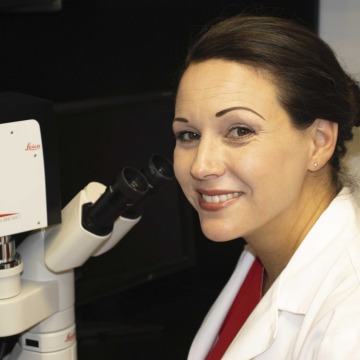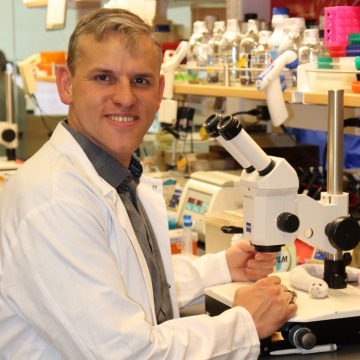SaddleBrooke Science Café
Desert View Performing Arts Center
39900 S. Clubhouse Drive, Tucson, AZ
UPDATE: In light of continued concerns for public safety and recommendations to minimize the spread of the COVID-19 virus, the College of Science has decided to cancel the remaining Science Café talks scheduled for April & May 2020.
Human Disease: Pathways to Cures
In this series, a team of researchers from the Department of Molecular and Cellular Biology will shed light on our current understanding of human biology and disease. Our speakers will cover topics on basic cell biology, genetic testing and mechanisms of age related disease. Insights to cures and healthy aging will be revealed.
Ryan Gutenkunst
Associate Department Head & Assistant Professor, Department of Molecular and Cellular Biology and Associate Professor, Department of Ecology and Evolutionary Biology
Genetic Testing: Hype and Reality
Date/Time: 1/09/2020 | 6:30 PM
Venue & Address: Desert View Performing Arts Center, 39900 S. Clubhouse Drive, Tucson, AZ
Talk Description: Direct-to-consumer genetic testing is a booming industry. Providers claim that their tests can reveal critical information about your health and ancestry. But how reliable are those claims? Iâll discuss the science behind the hype. In particular, I'll cover what these companies are actually measuring about your genome and how they use those measurements to learn about your past ancestors and your future health. Together, weâll see how the complexities of human biology and human history limit what can be learned from genomic tests.

Justina McEvoy
Assistant Professor, Department of Molecular and Cellular Biology, BIO5 Institute and Pediatrics
Pediatric Cancers are not Like the Others
Date/Time: 2/13/2020 | 6:30 PM
Venue & Address: Desert View Performing Arts Center, 39900 S. Clubhouse Drive, Tucson, AZ
Talk Description: One of the major characteristic features of most cancers is the high number of mutations in key genes that are essential for tumor growth. Although this is still the current dogma in most adult cancers, sequencing studies over the past 10 years have revealed that pediatric tumors do not require a high number of mutations to progress. So, how do these cells become cancer with fewer mutations? In this talk, I will describe key contributing mechanisms that pediatric cancer cells utilize for disease progression.

George Stuphin
Assistant Professor, Department of Molecular and Cellular Biology, BIO5 Institute and Cancer Biology GIDP
(CANCELLED) The Science of Getting Older
Date/Time: 3/19/2020 | 6:30 PM
Venue & Address: Desert View Performing Arts Center, 39900 S. Clubhouse Drive, Tucson, AZ
Talk Description: Advances in medicine over the past two centuries have pushed life expectancy into the early 80s, allowing us to live longer and more productive lives. The downside is that advanced age is accompanied by reduced function of our bodies and increased risk of late-life diseases, such as cancer and Alzheimer's disease. These place a growing burden on our society for both personal well-being and ballooning healthcare costs. We will discuss changes in the underlying biology that fundamentally drive aging, and how these changes lead to disease. Join us and learn how we might prevent, slow, or even reverse these biological changes to maintain health later in life.
Missed a café? you can find recordings of each café on our Youtube channel!

